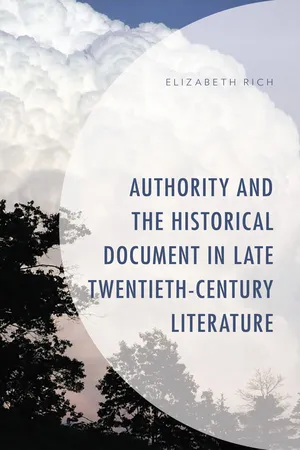
eBook - PDF
Authority and the Historical Document in Late Twentieth-Century Literature
- 243 pages
- English
- PDF
- Available on iOS & Android
eBook - PDF
Authority and the Historical Document in Late Twentieth-Century Literature
About this book
After the Fact: Authority and the Historical Document in Late Twentieth-Century Literature examines historiographic metafiction's epistemological concern with the historical document. The six texts herein recover official and neglected documents, viewing history from marginal perspectives endeavoring an ethical reconsideration of dominant historical narratives. Thematically paired chapters focus on eye-witness narratives, legal and official government documents, and news publications. The first two chapters, D.M. Thomas' The White Hotel with Toni Morrison's Beloved, explore the writers' reconsideration of eye-witness accounts, specifically the Holocaust survivor narrative and the slave narrative. The second pair reviews mythologies of the nation in the United States. Susan Howe's Singularities rewrites the Indian captivity narrative. Hannah Weiner's Spoke revises the 1868 Black Hills treaty to focus on how popular and official texts promote the colonial imaginary and function to justify colonial expansion. The final two chapters examine Margaret Atwood's Alias Grace and Robert Coover's The Public Burning, which critique the press's authority by questioning its claim to objectivity.
Frequently asked questions
Yes, you can cancel anytime from the Subscription tab in your account settings on the Perlego website. Your subscription will stay active until the end of your current billing period. Learn how to cancel your subscription.
No, books cannot be downloaded as external files, such as PDFs, for use outside of Perlego. However, you can download books within the Perlego app for offline reading on mobile or tablet. Learn more here.
Perlego offers two plans: Essential and Complete
- Essential is ideal for learners and professionals who enjoy exploring a wide range of subjects. Access the Essential Library with 800,000+ trusted titles and best-sellers across business, personal growth, and the humanities. Includes unlimited reading time and Standard Read Aloud voice.
- Complete: Perfect for advanced learners and researchers needing full, unrestricted access. Unlock 1.4M+ books across hundreds of subjects, including academic and specialized titles. The Complete Plan also includes advanced features like Premium Read Aloud and Research Assistant.
We are an online textbook subscription service, where you can get access to an entire online library for less than the price of a single book per month. With over 1 million books across 1000+ topics, we’ve got you covered! Learn more here.
Look out for the read-aloud symbol on your next book to see if you can listen to it. The read-aloud tool reads text aloud for you, highlighting the text as it is being read. You can pause it, speed it up and slow it down. Learn more here.
Yes! You can use the Perlego app on both iOS or Android devices to read anytime, anywhere — even offline. Perfect for commutes or when you’re on the go.
Please note we cannot support devices running on iOS 13 and Android 7 or earlier. Learn more about using the app.
Please note we cannot support devices running on iOS 13 and Android 7 or earlier. Learn more about using the app.
Yes, you can access Authority and the Historical Document in Late Twentieth-Century Literature by Elizabeth Rich in PDF and/or ePUB format, as well as other popular books in Literature & Historical Literary Criticism. We have over one million books available in our catalogue for you to explore.
Information
Table of contents
- Cover
- Contents
- Acknowledgments
- Introduction
- Nor Can the Living Speak for the Dead
- Recovering the Slave Narrative, Recovering Identity
- “Centuries Roam Audible Silence”
- “Theland isours”
- “In my opinion she is guilty as sin”
- A Brief History of Time
- Conclusion
- Bibliography
- Index
- About the Author